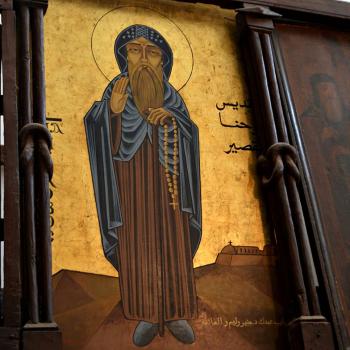
Source: no attribution/ pixabay
We know little about Amma Sarah; she is a saint of the church, whose feast is celebrated on July 13. It seems that she was born in a wealthy Christian family in the 5th century, but found herself through her education and innate desires, attracted to the ascetic life.[1] Her desire was to become pure at heart so that she could be united with God; this led her to a long struggle against the desires of the flesh, “lust” and “fornication,” for thirteen years. To do so, she became a hermit, residing next to a section of the Nile. She lived by herself for sixty years, though connected to the nearby monastic community “in the desert of Pelusium.”[2]
The fact that we have few saying from her, or other women in the desert, shows to us the difficulty many women had being accepted in the desert community. And this manifests itself in some of the sayings we have of Sarah, where we see her challenging men and their gender essentialism. Society creates roles for men and women which are often then essentialized, an essentialization which then society reaffirms by forcing men and women to keep to those roles and not be anything other than expected of them. In Sarah’s time and place, as with many other times and places, men were thought of as being strong while women were thought of being weak. This, then, became a part of the way people spoke about men and women, so that someone was said to be manly if they were strongly, and womanly if they were weak and feeble. Amma Sarah, encountering such disdain for women, was able to use the words of men against themselves, not because she accepted the nature men gave to the genders, but rather, to demonstrate their error by a creative reductio ad absurdum.
Thus, one time, in her old age, Amma Sarah was greeted by, and then treated rudely by, two old anchorites:
Another time, two old men, great anchorites, came to the district of Pelusia to visit her [Amma Sarah -ed]. When they arrived one said to the other, ‘Let us humiliate this old woman.’ So they said to her, ‘Be careful not to become conceited thinking to yourself: “Look how anchorites are coming to see me, a mere woman.”’ But Amma Sarah said to them, ‘According to nature I am a woman, but not according to my thoughts.’[3]
Gender discrimination, indeed, gender abuse, found itself within the Egyptian desert; two old men, thinking themselves great, thought they could and would embarrass the elder Sarah just because she was an old woman. Is this the fruit of a holy life? Is this what they learned in the desert? Clearly, it would have been better if they had stayed in the city and led a secular life instead of pretending to search for and gain some level of holiness if they then thought it was fine to go out and abuse an elderly woman. Yet, it is clear that they thought so highly of themselves, they led their pride lead them astray, thinking they had the right, like so many men do, to abuse a woman. Even if there is nothing sexual about their attack, it comes from, and is of the same kind of fault as is had with sexual abuse of women, where the point is that those who abuse others think their power and authority give them a right to manhandle anyone they want.
Amma Sarah took the abuse in stride; she demonstrated herself to be their superior. They might have looked at her and saw her as a woman, assuming all kinds of degraded ideas about her because of her gender; she dismissed their gender essentialism by telling them that she was not a woman in her thoughts, that is, though she was by nature a woman, that nature did not mean at all what the old men thought it meant. Their thoughts which they imputed upon her and upon men and women were false. She did not think of herself as a woman according to the way women were routinely designated by the men of her day. She knew that in Christ, gender was not to be treated with such ideologies, for as Paul had said, in Christ there is neither male nor female (cf. Gal. 3:28). She transcended their gender ideology. Likewise, in a saying which seems to be connected with this story, she further indicated that what they assumed to be a man, she was, while what they assumed to be a woman, she found to be their lot: “She also said to the brothers, ‘It is I whom am a man, you who are women.’”[4]
Sarah did not think gender essentialism fit the Christian ideal, especially for those who lived in the desert, seeking union with Christ. Long before modern thought looked into and examined the ideological problems which lay behind gender essentialism, Amma Sarah repudiated it by turning it in on itself to those who would use it against her. She was a man – that is, she was whatever was assumed to be essential to man, while her critics, those who came to embarrass her, demonstrated the weakness of their spiritual life, and could be said to be all that they thought women were to be. When we try to essentialize genders, we limit people, and we will be able to find people who do not fit their assumed genders because of it: Amma Sarah, in his crafty reductio ad absurdum, showed that those who try to essentialize nature to denigrate others will find themselves the ones who are denigrated and will not fit the “gender” they claim to be.[5] She was, in a way, pointing out how Christians by nature are “transgender” in that they must follow Paul, denying the essentialism of gender, allowing man and woman alike to transcend the cultural imputations placed upon gender: this is not to deny the distinction or value of a person is connected with the gender, whatever it is, but what is important is that their nature lies in a way beyond all such essentialism. [6]
It is, of course, important to realize she did not have such a bad relationship with all the monks in the desert. Many lived their lives properly, and treated her with the respect she gave to them. Thus, we read from her sayings once when she gave out a basket of fruit for a group of monks who came to visit her. They took out of it the old, bad fruit, leaving her the good to have for herself, to which she recognized the hospitality and charity which is meant to be had by those who are to be honored with the title of monks.[7] While the desert community did not leave out of it the errors of the world, and there were a great number of sinners who joined the community to glorify themselves, the true spirit of the desert shines through with the greats, with those like Amma Sarah, who knew themselves in Christ and so did not let the world and its impositions hinder them in their walk with God.
[1] See Laura Swan, The Forgotten Desert Mothers (New York: Paulist Press, 2001), 35-7.
[2] Ibid., 35. Benedicta Ward, however, thought she lived by herself, without joining any particular community. “However, an exception to this pattern of withdrawal suggests that a change of dress was neither universal nor fundamental: amma Sarah lived alone by the Nile for sixty years without wearing male attire or joining a convent of nuns.” Benedicta Ward, Harlots of the Desert (Kalamazoo, MI: Cistercian Publications, 1987), 62.
[3] Sayings of the Desert Fathers. Trans. Benedicta Ward (Kalamazoo, MI: Cistercian Publications, 1984), 230 [Saying 4].
[4] Sayings of the Desert Fathers, 230 [Saying 9].
[5] As Laura Swan indicated, at the time Sarah lived, women were seen as irrational and material beings, while men were seen as rational and spiritual, indeed, otherworldly in principle. See Swan, The Forgotten Desert Mothers, 39.
[6] This is highlighted in the way many women ascetics are praised for being “manly,” with some of them even taking on and living out lives as men in monastic communities. They did not find themselves trapped by their gender: they rose above all the expectations placed upon them, becoming holy saints in the process.
[7] See Sayings of the Desert Fathers, 230 [Saying 8].
Stay in touch! Like A Little Bit of Nothing on Facebook












